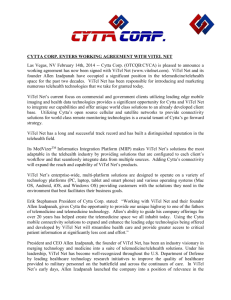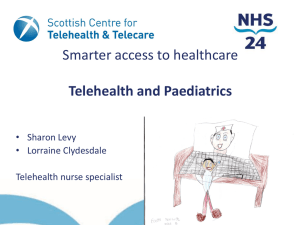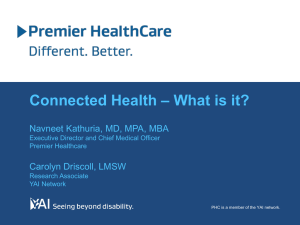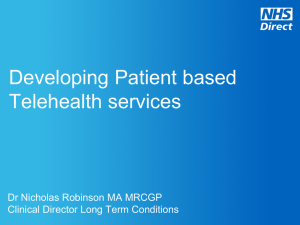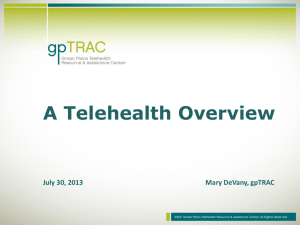Telehealth - Draker Cody Inc.
advertisement
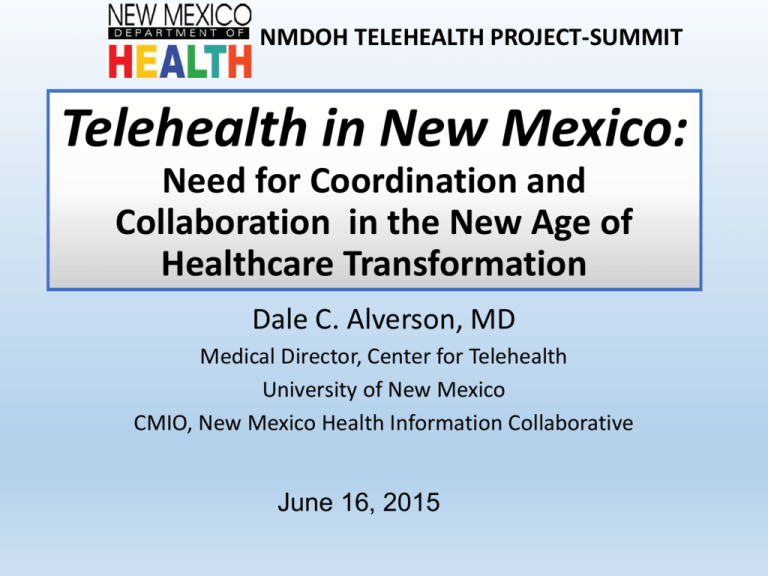
NMDOH TELEHEALTH PROJECT-SUMMIT Telehealth in New Mexico: Need for Coordination and Collaboration in the New Age of Healthcare Transformation Dale C. Alverson, MD Medical Director, Center for Telehealth University of New Mexico CMIO, New Mexico Health Information Collaborative June 16, 2015 Health Care Reform/PPACA Economic Downturn Emerging Enabling Information Communication Technologies Need for more Access to Care An Aging Population/Baby Boomers Critical Shortage of Healthcare Providers EHR Adoption/HIE Meaningful Use ICD10/11 PCMH ACOs A Time for Telemedicine & e-Health Telemedicine and eHealth: The General Concept Defining Telemedicine and Telehealth “Tele-” comes from the Greek root word meaning “distant or remote”/ “at a distance”. • • • • • • Tele-phone Tele-vision Tele-graph Tele-gram Tele-scope Tele-Etc, etc, etc a combining form meaning “distant,” especially “transmission over a distance,” used in the formation of compound words So What is Telemedicine/Telehealth? • The use of advanced telecommunications technologies to exchange health information and provide healthcare services across geographic, time, social and cultural barriers (J. Reid) • Telehealth is more than just video-conferencing and encompasses health information exchange and a spectrum of health information technologies • It is simply the delivery of health services at a distance (A. Darkins) “Back to the Future” So What is e-Health? • Healthcare practice supported by electronic processes and communication • Includes Electronic Health Records (EHR), Computerized Physician Order Entry, and e-Prescribing • Health Information Exchange (HIE) • “Digital Health” Health Information Exchange and Telemedicine : A Complimentary Piece of the Puzzle Telemedicine and Health Information Exchange (HIE) • Telemedicine creates the “virtual” consultation and provision of service between providers and patients = access to care • HIE creates the consolidated “virtual” medical record about the patient from a variety of electronic health records and sources = access to the patient’s health information How is Telehealth & e-Health used? • Clinical (“Telemedicine”): Direct Patient Care and Consultation, Case Reviews • Educational: Providers, Students, and Patients • Research: Community-based Participatory, Outcomes driven • Public Health • Administrative: Strategic planning, Operations • Sharing Health Information • Enhanced Disaster Response Telehealth as an Integral Part of Our Healthcare System • • • • • • • • • Becoming a Standard of Care/Part of Work Flow Avoiding Unnecessary Variations in Care Part of Patient protection and Affordable Care Act (PPACA) The “Triple Aim”: Patient Centered, Improved Outcomes, Reducing Costs Prevention: Avoiding ED visits and Hospitalization Pay For Performance (P4P) Accountable Care Organizations (ACOs) Impacting Ambulatory Sensitive Conditions Patient Centered Medical Home (PCMH) Telehealth and Health Information Technologies: Part of the Solution in Creating the Medical Home and Enhancing Access Hitting the Targets: “The Triple AIM” Improve Patient Access Telehealth Improve Health Outcomes Reduce Costs Involving the Patient Telehealth Networks Rural/Remote Health Providers Can Access Expert Medical Opinions, Knowledge, Education via Telehealth Rural or Remote Location Telehealth Network Audio High-Resolution Images & Video Patient Student Local Health Provider Specialty Medical Center Medical Specialty Teams Consultation Direct Patient Care Case Reviews Education Training Health Information Exchange Community-Based Research Telehealth in New Mexico Brief History of Telehealth Milestones in NM • UNM Center for Telehealth founded through state legislation and started in 1995 • Other HealthCare providers becoming involved in Telehealth Activities 2000 • The ECHO project launched in 2003 as a Hepatitis C educational, case-review model • NM Telehealth Alliance, non-profit 501c3 founded in 2004 • NM Telehealth Act passed into law 2004 • Medicaid established Telemedicine rules in 2007 • NM Telehealth and HIT Commission formed in 2007 • FCC Southwest Telehealth Access Grid Proposal approved 2007; Brings in $15.4 million federal funds for broadband connectivity Brief History of Telehealth Milestones in NM (cont.) • Parity telemedicine reimbursement laws passed in 2013 • Broadband Assessment and Recommendations: Education, Healthcare, and Economic Development; Report released 2013 • Medicaid updated Telemedicine Rules in 2014 • Removed rural requirements for originating sites • No longer required a certified health professional be with the patient at the originating site • Allows use of store and forward applications • Telehealth Fund created at NM DOH July 2014 • Neurosurgery Tele-stroke CMS ACCESS Grant funded $15 million 2014 • New Mexico receives very high grades from the American Telemedicine Association (ATA) on a national level when compared to other states 2015 Insurance Coverage for Telemedicine Services Passed and Signed into Law 2013 New Mexico Telehealth Act Passed and Signed into Law 2004 Introduced by: Sen. Jerry Ortiz y Pino (D) and Rep. Stephen Easley (D) Introduced by: Rep. Danice Picraux(D) and Supported by Sen. Susan Wilson-Beffort (R) SENATE BILL 69 HOUSE BILL 581 HOUSE BILL 171 46TH LEGISLATURE - STATE OF NEW MEXICO ECHO: Treatment Outcomes Outcome ECHO UNMH P-value N=261 N=146 Minority 68% 49% P<0.01 SVR (Cure) Genotype 1/4 50% 46% NS SVR (Cure) Genotype 2/3 70% 71% NS SVR=sustained viral response NEJM : 364: 23, June 9-2011, Arora S, Thornton K, Murata G, et.al. Direct Patient Care Maternal Fetal Medicine-High Risk Pregnancy Genetic Counseling School Based Health Centers Telehealth assistants at the school or child care center provide the link to examine the eyes, ears, throat, lungs and skin. Videoconferencing provides the “face to face” interaction. “Getting providers to think of their desktop computer as an exam room is the trick.” Dr. Neil Herendeen 24 Family Visitation “Store and Forward” • Capturing an image and storing it to then be forwarded for review by a medical specialists • Examples include teleradiology, telepathology and teledermatology, tele-ophthalmology (retinal scans) • “Telemedicine” or HIE?/It’s about connecting patients and providers to achieve better care Teleradiology and Image Transfer Web-Based Portals Diabetic Retinopathy Retinal Scans: Trauma Triage 44% Transfer Avoidance 27% Management Recommendation Changes Moya M, Valdez J, Yonas H, Alverson DC. The Impact of a Telehealth Webbased Solution on and Consultation. Telemedicine and eHealth, 2010; 16:945-949 Access to Critical Cerebral Emergency Support Services (ACCESS): Expanding New Mexico's telehealth network to include all 30 hospitals statewide. CMS Innovation Grant $15 million http://hsc.unm.edu/emermed/PED/ChildReady/CR.shtml Behavioral Health Center for Rural and Community Behavioral Health (CRCBH) Psych Emergency Services (PES) http://psychiatry.unm.edu/centers/crcbh/index.html Behavioral Health Services – PTSD/TBI Suicide Prevention IRA HAYES Teledermatology (Store and Forward) ENVISION http://www.envisionnm.org/index.php/telehealth/comm-tc/ CYBER CF (Cystic Fibrosis) Support Groups Transitions of Care Consultative Clinic Pediatric Intensive Care Pediatric Cardiology Pediatric Oncology Southwest Telehealth Access Grid (SWTAG): a “Network of Networks” that can support both Telehealth and HIE FCC RHCPP Awarded $15.5 million to cover 85% of build-out and operations of broadband networks for healthcare Navajo Rural Health Project Hospital Chapter House Navajo Homes Broadband Connection C.H.R. Community Health Representative (C.H.R.) Telehealth: Dynamic Emerging Technologies Video Options • H.323 Video Conferencing Systems (e.g. Polycom, Tandberg and use of IP addresses) • H.324 Video phones (analog) • Video SIP Client (e.g. Jabber, federated MS Lync etc.) • Cloud based video conferencing (e.g. Vidyo, Zoom): hosted or non-hosted, BYOD • “WebRTC” (Real Time Communications): Secure Web browser access Telehealth Toolkit SaaS (SIP&the Cloud) Videophone (H.324) Skype Software IP Based (H.323) Desktop IP Based (H.323) Small Conference Room IP Based (H.323) Hand Held Devices- “mHealth” iPhone Droid iPhone Smart Phones and Tablets Remote Monitoring The “Smart Band-Aid” Smart Phone “Snap-Ons” or Blue Tooth to Mobile Devices TytoCare Eye exams via your Smart Phone “Google Glass” (A Passing Fad?) Rafael Grossmann, MD, FACS at Google Glass's first surgical appearance Tele-mentoring, Tele-Supervision, Teaching &Training Telehealth Resources The New Mexico Telehealth Alliance Telehealth Alliance “Networks of Networks” • Represents a consortium of public and private health care stakeholders: “Neutral Territory” (501c3) Providers Consumers Telehealth Expertise Communication Networks • Reflects the diversity of our health care delivery system in New Mexico Social Networks • Enables collaboration The 4 “C’s” Cooperation Coordination Collaboration Communication ATA Interstate Telehealth DG http://www.telehealthresourcecenter.org/ http://www.americantelemed.org Interstate Telehealth Discussion Group http://ctel.org/ The Future and Next Steps Telehealth Planning: Keys to successful implementation • Feasibility and Needs Assessment • Technology Planning: Platforms for both consulting and originating sites, connectivity, security • Operations Planning: Workflow, workforce, C/P, Licensure, Documentation/Integration with EHR, scheduling vs. 24/7emergencies, reimbursement (parity legislation) • Business Planning: Integration with strategic direction, Sustainability, ROI • Evaluation Planning: data collection, metrics of success • CQI Legal and Regulatory Ramifications • HIPAA/HITECH • FDA/FCC • Liability and Malpractice Insurance/Risk Reduction • Standards of Care • Credentialing/Privileging and Licensure Telehealth: Next Steps (7) and Strategic Path Forward in New Mexico 1. Coordination and Collaboration 2. Meeting Healthcare Needs 3. Overcoming Barriers 4. Connectivity and Technical Support Services 5. Network of Telemedicine Clinic Originating Sites 6. HIE Integration 7. Research and Evaluation, ROI, Value Based Accountability (VBA) 1. Need for Centralized NM Telehealth Resource Center • Enhance coordination of telehealth services and provide platform for collaboration • Provide a listing and contacts (Data Base/“Catalogue”) for specific available telehealth services • Answer question regarding provision and receiving of telehealth services • Provide telehealth education and training as needed • Follow established guidelines and standards of care • Evaluate the impact and provide CQI • Serve as a single point of contact for other entities interested in telehealth 2. Ongoing Needs Assessment • Telehealth services should be implemented that address define healthcare needs of communities, providers, and patients throughout NM • Develop ongoing periodic surveys for needs assessments 3. Identify Issues and Barriers Affecting Telehealth Services • Work with the Legislature, Governor’s office, and State Departments, along with Governing and Regulatory Bodies to address those barriers and find solutions 4. Develop Affordable Appropriate Broad-band and Technical Support Services • Develop “Cash Match Fund” for Federal Programs (FCC HCF, USDA DLT Grants) • Work with DoIT • Work with telecommunication industry • Provide support services for the FCC and USDA related healthcare programs and subsidies • Contract for secure, reliable NOC services 5. Develop Network of Telemedicine Clinic Originating Sites 6. Integrate with Health Information Exchange (HIE) initiatives • Patient healthcare information, medical history, and documentation should go hand-in-hand with telemedicine services, similar to in-person services 7. Continued Quality Improvement • Research and Evaluation • Value-Based Accountability • Return on Investment • Meeting the Triple Aim • Ongoing Assessment Promoting Adoption and Overcoming Barriers • It takes a Transdisciplinary Team and Collaboration • Belief in the Value • Demonstrating the Value • Dedication • Persistence Questions & Comments?
